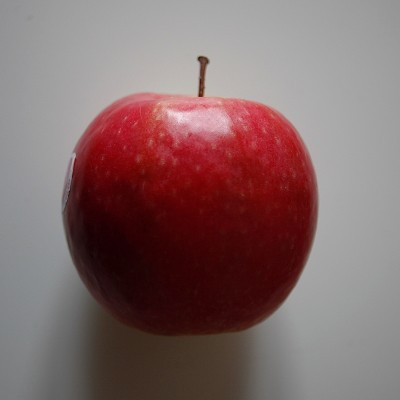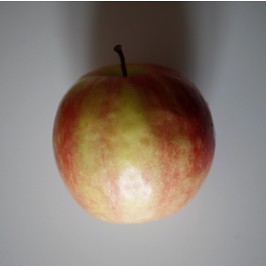The Life of an Apple.




From the mother tree to the hands of a consumer, an apple has a very ordinary life. Rarely is it rejuvenated. Seldom are its seeds acknowledged, planted and patiently attended to.
For the great majority of people, the process of eating an apple has a clear beginning and end. First, an apple must be chosen. Apples are organized as if to assume they are all the same, as if picking up one will ultimately end in the same satisfaction of any other. They are always piled together, yet separated from all other varieties. They are not separated by quality. They are not separated by smell.
The smell of each variety of apple is different, let alone the smell of each individual apple. The secret is to smell the apple at its core, near the stem. Its true life, flavor and richness can be derived from this aroma. The pungent scent of a perfectly ripe apple may even jolt you into the future, the moment when the knife breaks the apple’s thin barrier, and the first succulent piece is slipped into your mouth.
The smell is one thing, but the beauty of an apple is another. There must be no brown marks intruding in the fantasy of perfection. The design of a worthy apple is a unique painting, with only red, yellow or green paint at its disposal. For beauty that prevails over limitations is even more extraordinary.
A lonely shopper may linger in front of the apple stand without a record of time, searching for flawless individuals. Until the perfect group is composed, which in all likelihood is never, the lonely shopper will not be contented. Other curious shoppers may look and wonder what mystery lies in finding the perfect bunch of apples. Soon this brief experience with curiosity will float out of their ears and baby food, potato chips and bacon will return.
The apples are placed in a fruit basket with an array of other fruit upon returning home, their individuality once more taken away. Rarely will an apple be eaten immediately. It’s as if they ought to be forgotten. Days will pass, but the apples remain in their place, ever so modestly. Forgetting their presence makes having them so much sweeter.
A red glint catches your eye while standing in front of the pantry. And you remember them. Their simplicity settles your indecision.
The knife is out, and the apple is standing upright, its posture prepared for the sacrificial moment. The best way to cut an apple is into sixteenths. Eighths are entirely too big, and thirty-seconds butcher the exquisite crispness of a well-chosen apple.
You place the apple slices into a shallow bowl. Like clockwork, they disappear, one after another, time taking no toll on even the last piece. The bowl sweating the apple’s remains is usually placed into the sink and forgotten. But something is in the air. Something is different. You look down at the bowl, millimeters before its submersion into the murky dishwater, and you notice a little brown seed.
As if planting seeds is a completely revolutionary idea, you realize you could plant this seed. You could have your own apple tree. New fantasies race through your mind, not of perfection, but of growth.
Out of ten apple seeds, only about three will germinate and live to adulthood. You have one seed. It takes more than six years to even discover whether the seed you plant will grow into a full-sized tree and bear edible fruit. There is a one in twenty chance of having a tree with edible fruit. There is an even smaller chance that the fruit will be as tasty as its mother. You are tempted to throw away this apple seed like all the others, and continue buying apples that you aren’t required to invest anything in. Your mind searches for reasons to abandon your familiar practices to consume and discard. You remember a concept you have often applied to your own life: it is the not end result that matters, but the process from which you learn everything.
So you plant the apple seed and wait. Maybe you’ll learn something along the way. But don’t forget, you need two trees to make fruit. Apple trees cannot pollinate themselves. And now you’ve already learned something, no matter how well you care for your little apple tree, its purpose will stay unfulfilled without a companion to complete the cycle, to take the ordinary out of its life.
1 comments:
I LOVE this...poetic in many ways. You have a wonderful blog.
Post a Comment